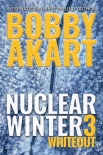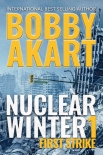Nuclear Winter Whiteout Bobby Akart (love letters to the dead .txt) 📖

- Author: Bobby Akart
Book online «Nuclear Winter Whiteout Bobby Akart (love letters to the dead .txt) 📖». Author Bobby Akart
“I walked down to the sheriff’s office,” he replied and then briefly explained what he’d learned, especially the part about the town rallying to help them.
“Have they told you anything about your dad?” she asked.
“Nothing, except I saw both of his doctors and a few nurses in there just now. Nurse Ruiz said they’d come see us here, and reminded me that dad’s condition was more complicated.”
Tucker looked down at his feet. He was unsure whether the term complicated was in reference to the amputation or his exposure to the bitter cold. He pulled a chair next to his mom and sat down; then he told her more about what Sheriff Mobley had done for them. They made small talk in an effort to pass the time until the doctors arrived.
The door opened slightly, and Dr. Brady was giving instructions to Ruiz about another patient in the ICU before finally entering the room. Tucker immediately stood to greet him, and Lacey tried before plopping back into the wheelchair. She’d need more rest and some nutrition before she could stand on her own.
Dr. Brady held the door open, and shortly thereafter, Dr. Forrest joined him. He allowed Dr. Brady, as Owen’s attending physician, to speak first. He addressed Lacey.
“Okay, as you know, your husband is awake and somewhat alert. There are a couple of things you need to know, so I’m gonna get right to it so you can see him before he nods off.
“We performed a series of tests on Owen just as we did for the both of you when you woke up. There are some positive signs. His eye response is fairly good. He responds to our verbal commands. When we asked him to perform certain physical functions on command, he was unable to do so. His inability to do this could be related to his drowsy state or general disjointedness. Time will tell. But the larger concern is related to his verbal responses.”
“Are you saying he can’t talk?” asked Tucker.
Dr. Brady scowled as he tried to find the words to explain Owen’s condition that could be understood by a layman.
“The brain is a very complicated part of the body, Tucker. The Glasgow analysis is designed to assess brain function without conducting more invasive tests. The verbal response test is designed to determine his higher cortical function. In other words, how does his brain allow him to communicate coherently, react, remember, and even react to pain.
“Unfortunately, Owen is having difficulty responding to us. He uttered incomprehensible sounds, and when he did manage to speak, the words were used inappropriately to the questions.”
“My god,” said Lacey, who began to cry.
“Now, let’s be clear,” said Dr. Forrest. “We are in the early stages of your husband’s recovery process. Traumatic brain injuries like his may take weeks or months to fully recover from. He’ll need to be seen by a neurosurgeon, probably at one of the hospitals in Colorado Springs, when he’s able to travel. After that, the normal course is physiotherapy and reoccurring psychological assessments.”
Dr. Brady stepped in. “The good news is that he’s alive.”
“Does he know about his legs?” asked Tucker.
“There’s no indication that he does,” replied Dr. Forrest. “In fact, it’s not that unusual during a post-op recovery. Many amputees believe the limbs are still there until they observe the results of the surgery for themselves.”
“Can we see him?” asked Lacey.
Dr. Brady answered her. “Absolutely. In fact, we hope that your presence might help him become more alert and responsive to verbal stimuli. The key is to remain calm and speak words of encouragement. Owen needs to know he has your love and support.”
Tucker quickly moved behind his mother and grabbed the handles of the wheelchair. “Let’s go.”
“All right, but remember, let’s not overload him with information. Keeping him relaxed will be the best medicine right now.”
Dr. Brady led the way as Lacey and Tucker followed close behind. Tucker had already seen his dad after the surgery, so he wasn’t shocked by the sight of him without his lower legs. When Lacey saw him for the first time, she covered her mouth, and tears flowed down her cheeks. Her family’s life often revolved around outside activities. Owen would be crushed when he learned of the amputation.
For now, however, she rejoiced in his being alive and awake. Tucker pushed her wheelchair until she was at Owen’s side. Then, like her son had done before her, she disregarded her doctor’s orders and pushed herself out of her chair to grasp the bed rails. She needed to be as close to Owen as possible. Tucker wrapped his arm around her waist and supported her so she could lean closer.
She wiped away the first flood of tears and regained her composure after a few sniffles. She lovingly touched his face and said, “Honey, I’m here for you. I love you so much.”
Owen’s eyelids fluttered and opened slightly, staring directly upward. Both Dr. Brady and Dr. Forrest stepped a little closer to the bed.
“Recognition,” whispered Dr. Brady. “A great sign.”
Lacey continued. “Tucker’s here with me. Our son is a very brave young man. You’ll be so proud of him.”
Owen’s eyes shifted from left to right. Then up and down. Tucker picked up on his eye movements and presumed his dad was searching for him. He continued to hold his mother and leaned over the bed.
“I’m right here, Dad. We’re all together again.”
Then Owen did something that sent elation through the minds of everyone in the room. He blinked rapidly, and a slight smile came over his face. Lacey began to cry again.
“That’s right, Owen. We’re all here. All three of us are together again, and we’re gonna make it through this. You’ll see. We love you so much. Just hang in and get—”
Lacey stopped mid-sentence as Owen’s body convulsed, and then his chest heaved, lifting him off the bed. Alarms started going off, and lights flashed on the monitoring equipment on both sides of the bed.
Nurse Ruiz rushed around the back




Comments (0)